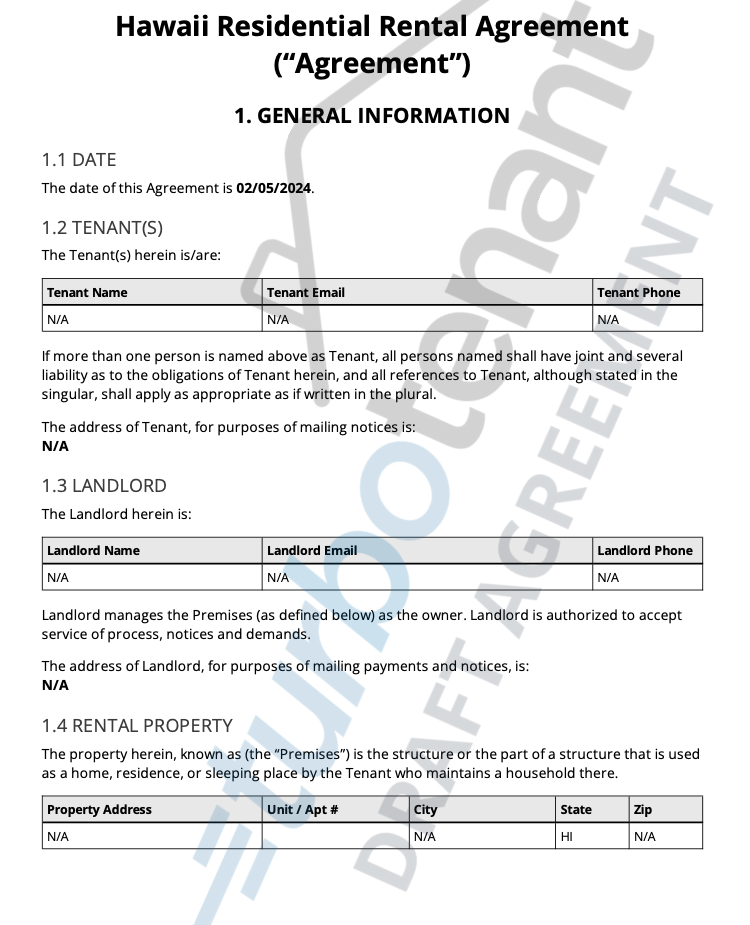
In Hawaii, crafting lease agreements that comply with state-specific legal requirements is crucial for both landlords and tenants. TurboTenant’s Hawaii Lease Agreement Generator and Templates, created with input from Hawaii legal professionals, ensure that landlords remain compliant and well-protected as they rent out their properties. This article provides an overview of the essential elements of a Hawaii lease agreement, highlighting the state-specific regulations and best practices for a smooth rental process.
Section 1 – Custom to You
This section allows landlords to input details specific to their rental situation, ensuring a tailored approach to each lease. Important features include:
- Additional Provisions: Landlords can include property-specific rules or necessary local clauses. Reviewing these provisions with a lawyer is recommended.
- Lost Key Policy: Tenants are required to pay the full cost of rekeying the property if they fail to return all keys upon moving out.
Section 2 – Specific to Hawaii
Designed to meet Hawaii’s legal requirements, Section 2 incorporates clauses that are critical for compliance. Key provisions include:
- Late Fees (Section 2.1): Landlords may charge a late fee of 8% of the total unpaid rent if not received by the 5th day of the month.
- Security Deposit Provisions (Section 2.4):
- A landlord cannot demand a security deposit exceeding one month’s rent.
- Any pet deposit must also not exceed one month’s rent and is separate from the regular security deposit.
- Landlords must return the security deposit within 14 days post-lease termination or expiration, with an itemized statement of deductions if applicable.
- Entry/Access to Premises by Landlord (Section 2.8):
- Landlords have the right to enter the premises for inspections, repairs, or showings.
- In non-emergency situations, landlords will make a good faith effort to notify tenants at least two days in advance.
- Immediate access is permitted in emergencies or if the tenant requests repairs.
- Designation of Agent (Section 2.15): Landlords not residing on the same island must appoint an on-island agent to handle rent, notices, and legal processes.
Section 3 – General Clauses for Best Practices
This section includes clauses common to lease agreements across the United States, focusing on promoting healthy landlord-tenant relationships. Notable clauses include:
- Subletting (Section 3.1): Tenants are prohibited from subleasing without the landlord’s written permission.
- Altering or Improving the Property (Section 3.2): Tenants must obtain the landlord’s written consent before making any alterations or improvements.
- Choice of Law (Section 3.11):
- The lease agreement is governed by Hawaii law.
- Legal disputes will be resolved in the county courts where the property is located.
- Follow the Law (Section 3.14): Tenants must adhere to all federal, state, and local laws while on the property, avoiding nuisance behaviors.

FAQ
What constitutes a valid reason for entering the rental property?
Landlords may enter the property for valid reasons such as inspections, repairs, or showings. Notification will be attempted at least two days in advance in non-emergency situations.
How are security deposits handled in Hawaii?
Security deposits cannot exceed one month’s rent, and any pet deposit must also adhere to this limit. Deposits must be returned within 14 days after the lease ends, along with an itemized statement of deductions, if any.
What is required if a landlord does not reside on the same island as the rental property?
Landlords not residing on the same island must appoint an on-island agent to handle rent collection, notices, and other legal processes on behalf of the landlord.
TurboTenant Hawaii Lease Agreements
TurboTenant’s tools facilitate the creation of compliant and comprehensive Hawaii lease agreements. Utilizing TurboTenant’s Lease Agreement Generator and Templates allows landlords to navigate Hawaii’s rental laws confidently, ensuring peace of mind and protection for both parties involved in the rental process.
Hawaii Resources


